Ditapis dengan
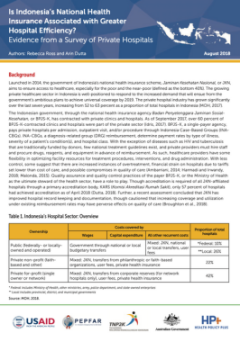
Is Indonesia’s National Health Insurance Associated with Greater Hospital …
Launched in 2014, the government of Indonesia’s national health insurance scheme, Jaminan Kesehatan Nasional, or JKN, aims to ensure access to healthcare, especially for the poor and the near-poor (defined as the bottom 40%). The growing private healthcare sector in Indonesia is well-positioned to respond to the increased demand that will ensue from the government’s ambitious plans to ac…
- Edisi
- 1
- ISBN/ISSN
- -
- Deskripsi Fisik
- PDF, 7 Halaman
- Judul Seri
- Policy Brief
- No. Panggil
- 368.3 TNP.I
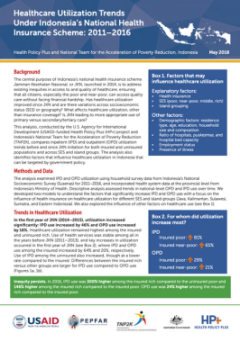
Healthcare Utilization Trends Under Indonesia’s National Health Insurance S…
The central purpose of Indonesia’s national health insurance scheme Jaminan Kesehatan Nasional, or JKN, launched in 2014, is to address existing inequities in access to and quality of healthcare, ensuring that all citizens, especially the poor and near-poor, can access quality care without facing financial hardship. Has healthcare utilization improved since JKN and are there variations across…
- Edisi
- 1
- ISBN/ISSN
- -
- Deskripsi Fisik
- PDF, 2 Halaman
- Judul Seri
- Policy Brief
- No. Panggil
- 368.3 TNP.H
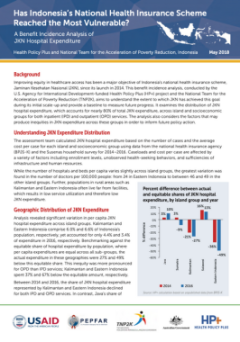
Has Indonesia’s National Health Insurance Scheme Reached the Most Vulnerabl…
Improving equity in healthcare access has been a major objective of Indonesia’s national health insurance scheme, Jaminan Kesehatan Nasional (JKN), since its launch in 2014. This benefit incidence analysis, conducted by the U.S. Agency for International Development-funded Health Policy Plus (HP+) project and the National Team for the Acceleration of Poverty Reduction (TNP2K), aims to under…
- Edisi
- 1
- ISBN/ISSN
- -
- Deskripsi Fisik
- PDF, 2 Halaman
- Judul Seri
- Policy Brief
- No. Panggil
- 363.8 TNP.H
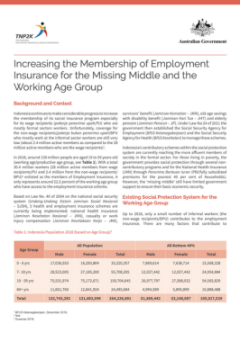
Increasing the Membership of Employment Insurance for the Missing Middle and …
Indonesia continues to make considerable progress to increase the membership of its social insurance program especially for its wage recipients (pekerja penerima upah/PU) who are mostly formal sectors workers. Unfortunately, coverage for the non-wage recipients/pekerja bukan penerima upah/BPU who mostly work at the informal sector workers are still very low (about 2.4 million active members as …
- Edisi
- 1
- ISBN/ISSN
- -
- Deskripsi Fisik
- PDF, 2 Halaman
- Judul Seri
- Policy Brief
- No. Panggil
- 363.3 LAR.I
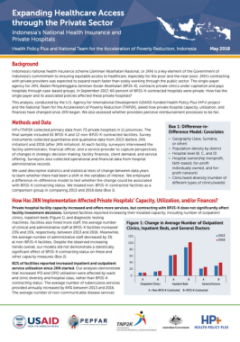
Expanding Healthcare Access through the Private Sector Indonesia’s Nation…
Indonesia’s national health insurance scheme (Jaminan Kesehatan Nasional, or JKN) is a key element of the Government of Indonesia’s commitment to ensuring equitable access to healthcare, especially for the poor and the near-poor. JKN’s contracting with private providers was expected to expand reach faster than solely working through the public sector. The single-payer agency for JKN, B…
- Edisi
- 1
- ISBN/ISSN
- -
- Deskripsi Fisik
- PDF, 2 Halaman
- Judul Seri
- Policy Brief
- No. Panggil
- 368 USA.E
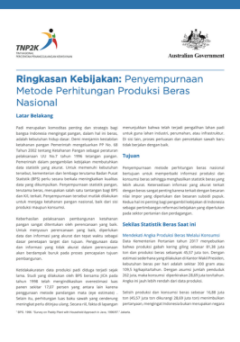
Ringkasan Kebijakan: Penyempurnaan Metode Perhitungan Produksi Beras Nasional
Padi merupakan komoditas penting dan strategis bagi bangsa Indonesia mengingat pangan, dalam hal ini beras, adalah kebutuhan hidup dasar. Demi menjamin kestabilan ketahanan pangan Pemerintah mengeluarkan PP No. 68 Tahun 2002 tentang Ketahanan Pangan sebagai peraturan pelaksanaan UU No.7 tahun 1996 tetangan pangan. Pemerintah dalam pengambilan kebijakan membutuhkan data statistik yang akurat. Un…
- Edisi
- -
- ISBN/ISSN
- -
- Deskripsi Fisik
- PDF, 8 Halaman
- Judul Seri
- Policy Brief
- No. Panggil
- 363.8 ADJ.R
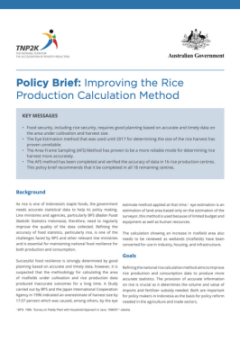
Policy Brief: Improving the Rice Production Calculation Method
As rice is one of Indonesia’s staple foods, the government needs accurate statistical data to help its policy making. Line ministries and agencies, particularly BPS (Badan Pusat Statistik: Statistics Indonesia), therefore, need to regularly improve the quality of the data collected. Refining the accuracy of food statistics, particularly rice, is one of the challenges faced by BPS and other re…
- Edisi
- 1
- ISBN/ISSN
- -
- Deskripsi Fisik
- PDF,
- Judul Seri
- PDF, 6 Halaman
- No. Panggil
- 363.8
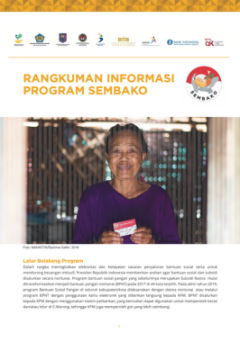
Rangkuman Informasi Program Sembako
Dalam rangka meningkatkan efektivitas dan ketepatan sasaran penyaluran bantuan sosial serta untuk mendorong keuangan inklusif, Presiden Republik Indonesia memberikan arahan agar bantuan sosial dan subsidi disalurkan secara nontunai. Program bantuan sosial pangan yang sebelumnya merupakan Subsidi Rastra mulai ditransformasikan menjadi bantuan pangan nontunai (BPNT) pada 2017 di 44 kota terpil…
- Edisi
- 1
- ISBN/ISSN
- -
- Deskripsi Fisik
- PDF, 8 Halaman
- Judul Seri
- Policy Brief
- No. Panggil
- 363.8 TIM.R
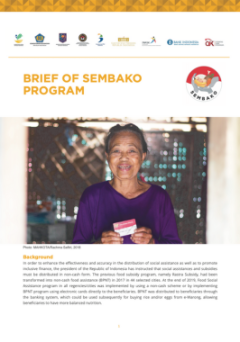
Brief Of Sembako Program
In order to enhance the effectiveness and accuracy in the distribution of social assistance as well as to promote inclusive finance, the president of the Republic of Indonesia has instructed that social assistances and subsidies must be distributed in non-cash form. The previous food subsidy program, namely Rastra Subsidy, had been transformed into non-cash food assistance (BPNT) in 2017 in 44 …
- Edisi
- 1
- ISBN/ISSN
- -
- Deskripsi Fisik
- PDF, 8 Halaman
- Judul Seri
- Policy Brief
- No. Panggil
- 363.8 TIM.B
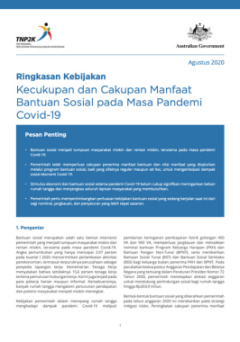
Ringkasan Kebijakan Kecukupan dan Cakupan Manfaat Bantuan Sosial pada Masa Pa…
Bantuan sosial merupakan salah satu bentuk intervensi pemerintah yang menjadi tumpuan masyarakat miskin dan rentan miskin, terutama pada masa pandemi Covid-19. Angka pertumbuhan yang hanya mencapai 2,97 persen pada kuartal I 2020 mencerminkan perlambatan aktivitas perekonomian, termasuk terpuruknya perusahaan sebagai penyedia lapangan kerja. Kementerian Tenaga Kerja menyatakan bahwa setidaknya …
- Edisi
- 1
- ISBN/ISSN
- -
- Deskripsi Fisik
- PDF, 12 Halaman
- Judul Seri
- Policy Brief
- No. Panggil
- 363.8 ASM.R

 Karya Umum
Karya Umum  Filsafat
Filsafat  Agama
Agama  Ilmu-ilmu Sosial
Ilmu-ilmu Sosial  Bahasa
Bahasa  Ilmu-ilmu Murni
Ilmu-ilmu Murni  Ilmu-ilmu Terapan
Ilmu-ilmu Terapan  Kesenian, Hiburan, dan Olahraga
Kesenian, Hiburan, dan Olahraga  Kesusastraan
Kesusastraan  Geografi dan Sejarah
Geografi dan Sejarah